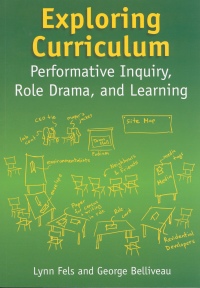| ________________
CM . . .
. Volume XV Number 5. . . .October 24, 2008
At the onset of this text, Fels & Belliveau outline two objectives for the purpose of their book. They state: "The first is to introduce performative inquiry, a research methodology and learning vehicle that Lynn has conceptualized and introduced into educational research. The key to performative inquiry is that drama (and other visual and performing arts) offers a valuable venue for inquiring and learning" (p. 12). Two following paragraphs describe this inquiry further, and then the second objective is presented: "to introduce teachers to role dramas as a strategy for exploring curriculum" (p. 13). Readers will find ample information on applying role drama to enhance learning in the curriculum, and they will learn what performative inquiry is all about. The information here is not so much new as it is presented with new terminology, surrounded by the authors' comments, quotes, helpful hints, and theoretical offerings on the subjects at hand. The role dramas are said to be "best suited for students in grades 4 through 12, yet of interest to and adaptable for students of all ages" (p. 13). Topics such as the Acadians, fish farming, and the Olympics are addressed in the role dramas. The text is set up in the following way: a chapter opens with a narrative conversation between 'Lynn and George' followed by a collection of narratives, definitions of terms, theoretical statements, inset lists, a smattering of hand-drawn sketches, numerous references, and a role drama. The above description may give the idea that this island of a book may be in need of a map, and although the table of contents should be a good version of one, it is a map in need of details. For example, the entry for Chapter 1's table of contents reads like this:
But in navigating the layout of information in Fels & Belliveau's book there are sub-categories, and tables that really deserve mention if readers are going to be able to pick it up and find their desired sections.
With a more detailed set of titles, finding the role dramas would be an easier task. Now, having said that, Appendix C, has two-page outlines of each role drama; however, this appendix does not include page numbers where the more detailed versions of these role plays can be found in each of the chapters. These comments may seem quite critical, but, because of the breadth and depth of information available in this text, organization is key for readers in finding what is important to them. Classroom teachers may not want to read through some of the more theoretical material, or the whole text for that matter, if they are looking specifically for the experiential strategies. Exploring Curriculum is daunting, and for the educator who is interested in the second objective of the book, engaging in role drama as a strategy for exploring curriculum, there are drama resources available that do a much better job of presenting, framing, and delivering the practice of role play (see David Booth, Jonothan Neelands, Gavin Bolton). It is also interesting to note that one of the authors sends out an acknowledgment to Jonothan Neelands, but throughout the entire text, Neelands name is spelled incorrectly. There is a wealth of material in this 286 page text, from engaging teaching stories to thought-provoking curriculum theory, and unfortunately, if anything will end up turning a reader away from the book, it will be the way it is organized and the editing errors. In the end, this text has good material, it just is not very user-friendly. Because of its limited audience, Exploring Curriculum is... Recommended with reservations. Jocelyn A. Dimm is a sessional instructor and PhD Candidate at the University of Victoria where she teaches drama education and young adult literature in the Faculty of Education.
To comment
on this title or this review, send mail to cm@umanitoba.ca.
Copyright © the Manitoba Library Association. Reproduction for personal
use is permitted only if this copyright notice is maintained. Any
other reproduction is prohibited without permission.
NEXT REVIEW |
TABLE OF CONTENTS FOR THIS ISSUE
- October 24, 2008.
AUTHORS |
TITLES |
MEDIA REVIEWS |
PROFILES |
BACK ISSUES |
SEARCH |
CMARCHIVE |
HOME |
